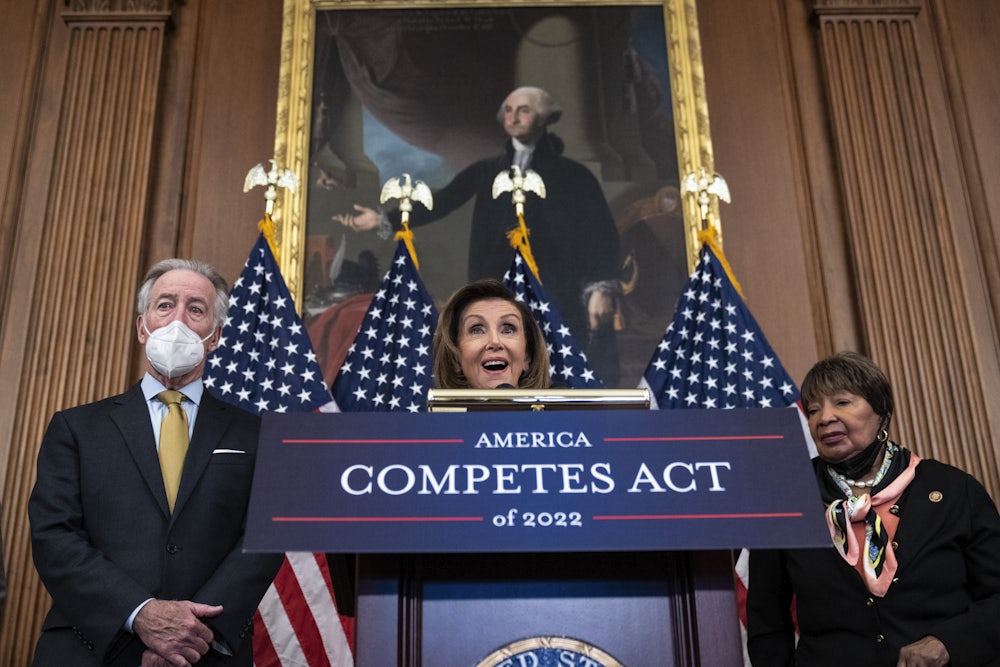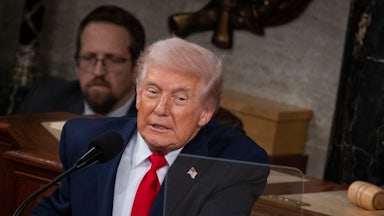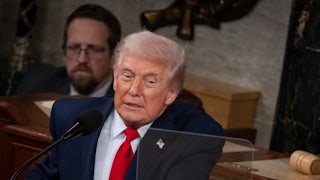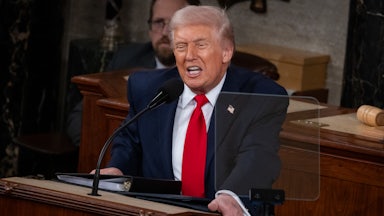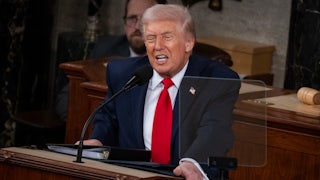The House gave President Joe Biden another reason to celebrate on Friday with the passage of a bill aimed at boosting competitiveness with China and soothing supply chain woes, capping a string of accomplishments for the administration to sell as victories this week. These include a robust jobs report that the administration and its allies are sure to tout and a strike on an ISIS leader—though the White House has denied blame for the additional deaths of several civilians, including children.
The passage of the competitiveness bill is well timed for the Biden administration. The House vote comes less than a month ahead of Biden’s State of the Union address and with the midterm elections looming, it hands the administration and congressional Democrats a significant policy victory. But the 2,900-page bill passed along party lines in the House will not be the final version. The Senate approved its own version of the bill last year, and both chambers are now expected to begin a formal conference process to forge a compromise measure that can be sent to the president’s desk, an increasingly rare occurrence in a Congress where most differences are hammered out among committee leaders before legislation even comes to a vote.
The bill has been a particular priority for Senate Majority Leader Chuck Schumer, who had pressed the House for months to move forward on the Senate version. “I’m pleased the House is taking this important step,” Schumer said in a speech on the Senate floor on Thursday. “Of course, we will have much more work to do to bridge our two proposals together, but the House’s vote this week sets us on the necessary course toward passing these policies into law.”
In a sign of how critical the bill is to the Biden administration, Commerce Secretary Gina Raimondo has spent the past several weeks pushing the House to get the legislation approved. There was a special urgency to her pleadings this week, when she met with House Democrats in a caucus meeting on Tuesday. “We have no time to wait. This is a historic investment in American manufacturing, American research, and development in emerging technology and just cannot wait any longer,” Raimondo said in an interview with NBC News.
The Biden administration has recently endeavored to pivot its messaging to the economy amid rising inflation and, in the wake of failures in the Senate, to approve voting rights legislation or the Build Back Better Act, the president’s signature public investment measure. Steady job growth and the implementation of a bipartisan infrastructure measure passed last year have given Biden talking points to tout an America on the upswing, even as his job approval rating lags. The president has promoted the competitiveness bill as an opportunity for bipartisan action to counter China and strengthen the economy. “Let’s get another historic piece of bipartisan legislation done,” Biden said in a speech celebrating a new Intel semiconductor plant in Ohio last week. “Let’s do it for the sake of our economic competitiveness and our national security.”
The bill addresses some of the most pressing economic issues for the Biden administration. Like the Senate measure, the House bill dedicates $52 billion to researching, designing, and manufacturing semiconductor chips, amid a global shortage that has led to delays in automotive production and increased costs. In recent years, the United States has lost ground in chip manufacturing to other countries, including China.
The House bill also aims to alleviate supply chain woes with $45 billion over six years to bolster the nation’s supply chains and increase American manufacturing of goods considered critical to the economy and to national security. It would dedicate $3 billion to establishing a domestic solar manufacturing supply chain, as well. Like the Senate bill, the House measure would invest billions in research and development, including a boost in funding to the National Science Foundation, although the two bills differ in how that funding would be deployed.
However, there are some key differences between the House and Senate bills that could cause consternation during the conferencing process. For example, the House bill included a provision to create a new Trade Adjustment Assistance. The program, which expired at the end of 2020, is aimed at helping workers negatively impacted by trade and Chinese competition. House Democrats had complained that the Senate bill had omitted Trade Adjustment Assistance and renewed the Generalized System of Preferences, which lowered U.S. tariffs on some imported goods without requiring that participating countries meet stricter labor and human rights standards.
Democratic Representative Dan Kildee of Michigan, who sponsored that legislation included in the larger competitiveness bill, told The New Republic that he was going to push for its inclusion in the final measure, although he acknowledged it may not have support from 60 senators. (Most legislation needs 60 votes to advance in the Senate, requiring support from at least 10 Republicans.) “If we all understand that, you know, everyone’s got to give a little, we’ve got to make sure we’re not the ones who are always giving. When it comes to the House and the Senate, the House has to have its prerogatives,” Kildee said.
Despite the bipartisan support for the companion measure in the Senate, the bill garnered only one Republican vote in the House. (GOP Representative Adam Kinzinger voted for it, while Representative Stephanie Murphy was the only Democrat to vote against it.) House Minority Leader Kevin McCarthy in a speech on Wednesday called the legislation “a bill that concedes to China.” Although the bill includes measures that have previously attracted bipartisan support, Republicans argue that it is too soft on China, with provisions such as easing immigration restrictions for entrepreneurs and high-level workers in science, technology, engineering, and mathematics.
They have also complained about measures to combat climate change included in the legislation. Representative Jim Banks, the chair of the Republican Study Committee, noted in a January statement that the COMPETES Act “includes millions to study coral reefs and gives billions to the United Nations Green Climate Fund,” but “there is no money to enforce our sanctions laws or increase our military strength.” (Late last year Congress approved, and Biden signed, the latest National Defense Authorization Act, which provided the Department of Defense with $770 billion—more than the Pentagon requested.) Republicans and business interests have also balked at language that would impose tariffs on small-value goods from China.
Republican Senator Todd Young, who had championed the Senate legislation, told reporters on Thursday that he understood why his GOP colleagues in the House might oppose the bill but that he believed many of them would be “very open to supporting whatever we produce in the conference” to reconcile the two measures.
“The reason Democrat leadership tells me that they produced a partisan bill is because they thought that that would expedite the process. Of course, that creates more work for us in the conference committee,” Young said. “But with that said, we will get to work very quickly trying to improve what we’ve done here in the Senate. And we’ll send House Republicans a much better option to vote on in the next couple of months.”
But GOP Representative Kevin Brady told reporters that he only believed House Republicans would be able to vote for a finished product if their Senate Republicans consulted with them in the conference process.
“I think that’s the best way to do this, because I think it’s a shame if this turns into a partisan—if the final product is a partisan exercise,” Brady said. “This is one of those rare opportunities where both parties have a stake in working together.”
